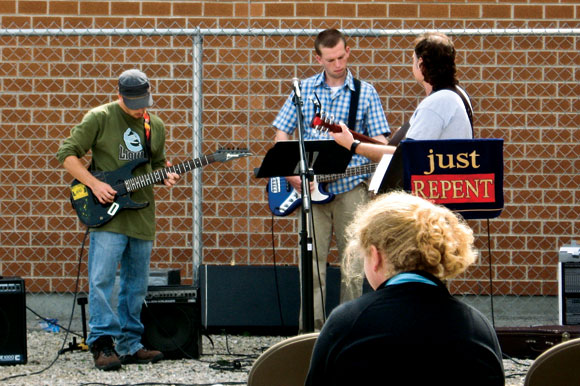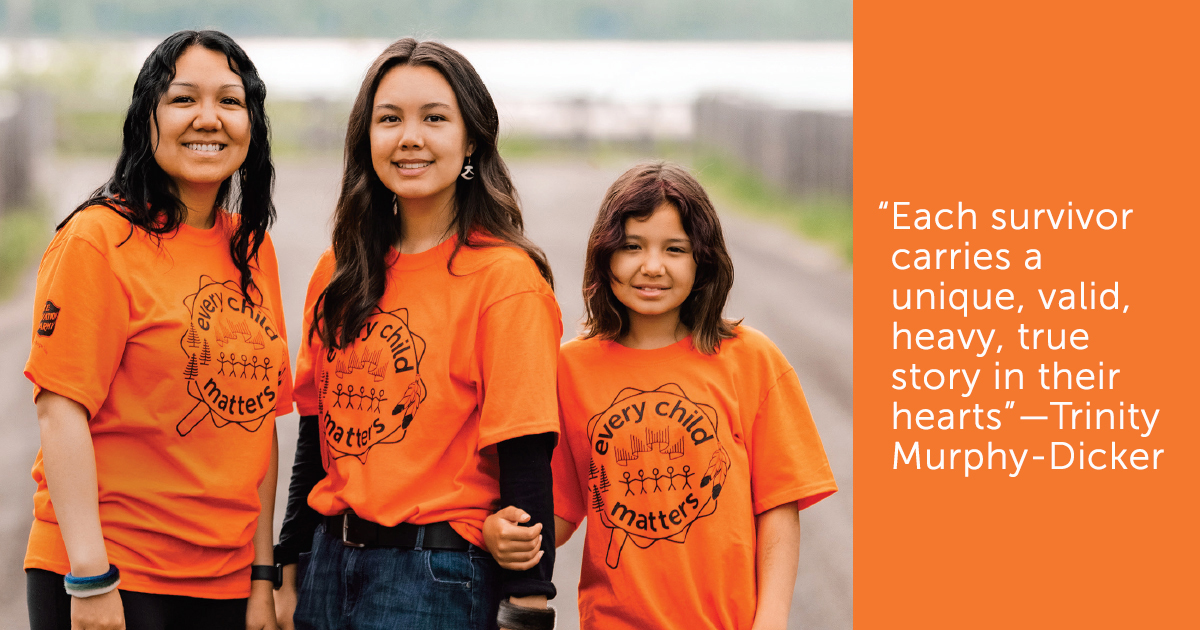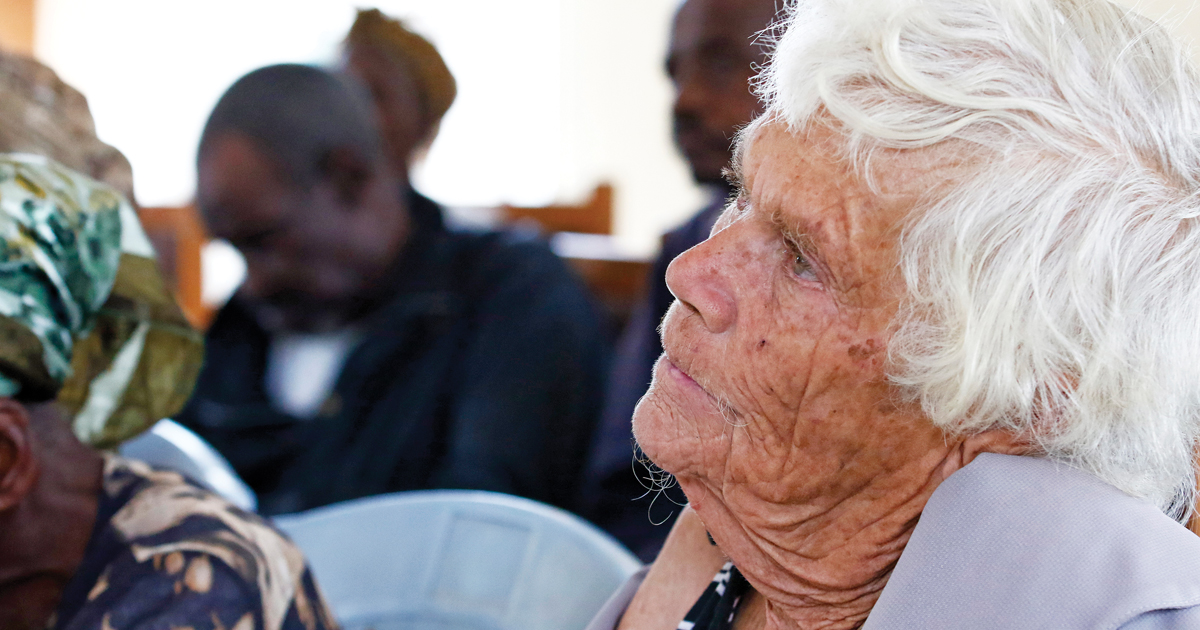From the DC's Desk
Greetings from the Ontario Great Lakes Division! The boundaries of this vast division stretch from the world-famous waterfalls in Niagara to the fabled Sleeping Giant of Thunder Bay, from the Ambassador Bridge that spans the Canada-U.S. border in Windsor to the historic gold mines of Timmins and beyond.

At the heart of the Ontario Great Lakes Division is the city of London, the birthplace of The Salvation Army in Canada. Here, in May 1882, Jack Addie and Joe Ludgate commenced a transformative work. Through God's faithfulness and the efforts of countless dedicated soldiers and friends, the Army has remained true to its God-given mission.
The Army's vibrant community-based programs continue to transform lives. And we are continually reshaping and refocusing our ministry to serve this present age. As we love God and others through our service, may the outcome of passionate ministry be realized: “… And the Lord added to their number daily those who were being saved” (Acts 2:47).
Lt-Colonel Lee Graves, Divisional Commander

Open Hearts of Acceptance
Cape Croker is an Aboriginal community located in a scenic, yet isolated, area on the shores of the Bruce Peninsula. The Chippewas of Nawash First Nation live in this community and many face challenges of unemployment, poor health, poverty and addictions.
Captain Mary Millar of The Salvation Army's Wiarton Community Church has been connecting with Cape Croker since 1994 through the food bank ministry. In 2008, Wiarton received funding for Aboriginal ministry and Pastor Tony Chegahno was hired to reach out to people living in Cape Croker. He, his wife, and his adult children and their families live and minister in the community.

Cape Croker Life Ministries includes an adult Bible study, visitation and family supports such as emergency food distribution, housework and counselling. At a lively Bible club, kids from Grades 1 to 4 meet Wednesdays after school to learn New Testament stories. Girls from Grades 5 to 8 have their own club where they discuss healthy relationships, growing in the Lord, knowing who they are and learning to embrace their capabilities. Future plans include a young men's ministry with sports, fishing, nature outings and life skills.
“The young Aboriginal people are gifted and talented. However, as with many other youth, they can suffer from deep scars due to lack of acceptance and not being able to embrace their identities,” explains Captain Millar. “That's why the Army's main emphasis is on the kids.
“In the past there has been resentment and lack of trust in the community at Cape Croker. However, the Lord is in the reconciliation business, and we see him bringing healing and respect.” Last year, a group of young Salvationists from an Army camping ministry ran a Blast Camp for 39 children. It was a great time of connecting, and the kids were thrilled that another mission team returned during March break.
Ministry in Cape Croker is built on patience, gentleness and respect. Generations of Aboriginal people have had their culture and confidence shaken by the Church. Now is the time for a more humble, respectful approach. “Aboriginal people have so much to offer,” concludes Captain Millar. “Our nation is richer because of them. We are excited about what God has in store.”

At the Centre of Hope is Community
London Centre of Hope is a multifaceted ministry that, since 2005, has been reaching out to the community through a family health program, a withdrawal management centre, child and family services and a 285-bed hostel.
Although the centre is large, staff members bring a community feel. Clients are involved in decision-making and all residents are invited to monthly consultation meetings on everything from the cafeteria menu to policy and procedures. Being involved in decision-making gives people a sense of ownership, and being treated with dignity and respect makes them feel like the centre is their home.
“People who live at the Centre of Hope put their names on their doors, saying 'I live here,' ” notes Major Neil Lewis, executive director. “They don't feel ashamed. The government wants to move people in and out of our centres as quickly as possible, but people need community. We create a home for our residents.”
Some who live at the Centre of Hope have never experienced a true sense of home or family, and so they get excited about activities such as movie night or building gingerbread houses at Christmas. Although most hostels are segregated, the Centre of Hope combines shelter services for men, women and youth. Although there are strict rules about separate floors for sleeping, everyone interacts during the day in this “little city.” Sixty percent of the guests at the Centre of Hope have mental health issues and have been suffering psychologically and socially for a long time. Being included in a community with loving relationships is invaluable to their healing.
Soulfood is a men's group where chaplains and clients cook, eat and share in a Bible study together. Two of the group's newest members, “Mark” and “Tim,” met Dan White, Centre of Hope chaplain, because of a fight they were having four months ago. After the argument, White met with the men individually to talk about their concerns, but also about their lives and their hopes. Since then, both men have made decisions for Christ and turned their lives around.
“God showed me that Mark, the younger one, really needed a father figure in his life,” notes White. “Mark's father had passed away and I talked to him about how God is our Father.” Mark and Tim get along now, and are part of a healthy fellowship of brothers in Christ.
Setting standards of love and community are working for the Centre of Hope. They recently received 97.6 on their accreditation, an in-depth review of their program. It was the highest score of any ministry unit in the Canada and Bermuda Territory.
They also opened a “high tolerance” drop-in centre for 30-70 people who are not accepted at other city shelters because they do not abide by the rules. Some have severe anti-social behaviour related to drugs or mental health issues.
“These people were truly outcasts,” says Major Lewis. “Instead of asking them to change in order to fit in, we asked ourselves how we could change to include them. Love is transforming these people.”
Coming In From the Outside
Kirkland Lake is a rural, northern mining town where the people have big hearts and always want to help each other. “People wave at us when they see the Salvation Army shield on our vehicle and the whole community helps us whenever we make a request,” says Lieutenant Anne-Marie Dagenais, corps officer.
Recently a father came into the food bank with non-perishable food items. Instead of gifts, his daughter had requested these items from her friends for her 10th birthday party.
Last October, a man walked into the Army centre and reported that someone had been living in the forest for three weeks. “He asked us to go visit the man in the woods, so we went, and brought coffee and soup,” explains Lieutenant Anne-Marie Dagenais. They discovered an elderly man named William Jones. “We convinced him that it was time for him to find a better place to live.”
The Army helped the man with clothing, food and regular visitation when he was admitted to the hospital. “He didn't realize he could apply for the Canada Pension Plan at age 65, and so when he could no longer pay the rent, he moved to the woods,” explains Lieutenant Claude Dagenais, corps officer. He is now doing well; his health is gradually improving and he is on a list for a room at the Teck Pioneer Residence, a long-term care home.
Kirkland Lake has a busy food bank, and Lieutenants Dagenais speak their mother tongue when serving French-speaking clients. Being served in their own language gives many people the opportunity to open up about spiritual and emotional issues.

A kitchen program is starting soon, and will include cooking classes, budgeting and safe food handling. Each person who attends will be able to cook once a month and return home with soup, two meals and dessert for their family. The kitchen program is a great opportunity for people of different cultures to share recipes and friendship. Some of the Aboriginal women living in the community expressed their discomfort with receiving a bag of groceries as a hand out. The principle of exchange is important to them, so they are looking forward to a program where they can contribute their cooking skills.
Lieutenants Dagenais are also responsible for The Salvation Army in Timmins, a two-hour drive away. “At our Christmas toy drive in Kirkland Lake and Timmins, we let parents come and pick out toys for their kids,” says Lieutenant Claude Dagenais. “We thought it would be more meaningful for them to be able to say to their child: 'I chose that for you.' People appreciated that act of dignity.”
In Timmins, a volunteer named Anna took leadership and opened the Sally Anna café. Every day of the week, she provides coffee, soup and a listening ear. People feel comfortable with Anna and the café gives them reprieve from the cold streets.
“I sometimes imagine William Booth roaming the streets of Timmins and inviting people to the Sally Anna café,” says Lieutenant Claude Dagenais. “It makes me proud to be an officer.”

Celebrating Abilities
Lawson Ministries in Hamilton supports people with developmental, physical and cognitive disabilities as well as mental health issues. Thirty-three adult tenants live in Lawson Ministries' supported-independent-living condominium and well over 100 attend day-programming opportunities.
At age 77, Morley is the oldest resident of Lawson Ministries. Morley lived in an institution for 69 years before moving to The Salvation Army. When he was about to move in, staff were told that he couldn't speak, walk or feed himself, but within weeks of care in one of the apartments, he started to shuffle to get into his armchair.
Now he feeds himself and regularly goes to hockey games and swims. Love and dignity have given Morley a new lease on life.
Lawson Ministries runs a Salvation Army thrift store in Caledonia that hires people with disabilities. “The customers love the fact that the store provides them with quality shopping experiences and generates meaningful work and competitive wages for the employees,” explains Deanna Finch-Smith, executive director. “Employment training is a big component of Lawson Ministries and many residents utilize the centre to access job training and to enjoy social and leisure activities. Some Lawson residents work at the Freeway café and church in Hamilton, serving coffee. They love going to the Freeway because it is casual, wheelchair accessible and friendly.”
Lawson Ministries' new Autism Centre is expected to be completed this summer. “There is a great need for this kind of service in our community,” explains Finch-Smith. “Autistic youth are allowed to go to school until they are 21, but after that there is often no place for them to go. Some families have to quit their jobs because they know their kids will not be safe on their own. They cannot afford a one-on-one worker.”
Consultations have taken place to ensure that the structure of the building is appropriate for the clientele. In addition to being wheelchair accessible, thought has gone into everything from the colour of the walls to the shape of the rooms to the feel of the carpet. The Salvation Army wants to provide a space that feels comfortable and safe for autistic clients. There will be a music room, an educational room, a gymnasium and a “Snoezelen” room (a therapeutic room with waterfalls, a waterbed and a variety of sensory lights).
Programs will be suited to clients' interests, passions and skills. That might include learning how to read through the DARE program (Determined Adults Reading and Education), doing horticulture in the rooftop garden or training for employment.
“My wish would be for anyone with a disability to be included in society and given respect and compassion,” concludes Finch-Smith. Her wish is coming true at Lawson Ministries.
 FAST FACTS
FAST FACTS
• The Ontario Great Lakes Division covers the Hamilton, Kitchener, London, Niagara and Windsor areas as well as much of Northern Ontario. It has 47 corps and 31 social services centres
• There are 117 Salvation Army officers, four auxiliary-captains, three lay pastors, 2,300 employees, 1,308 volunteers and 223 retired officers in the division
• Salvation Army corps (church) membership: 3,308 senior soldiers, 2,967 adherents and 438 junior soldiers
• The division has six advisory boards, 52 community and family services centres, 10 correctional and justice services offices and 10 emergency response vehicles
• 1,148 adults have successfully completed the Change is a Choice substance use program in the past five years
• London Village houses a state-of-the-art daycare centre for children and offers respite care to individuals with special needs. Through a partnership with the Alzheimer Society, the Village also provides free caregiver support groups to family and friends of individuals diagnosed with Alzheimer's disease
• In 2008, at London Centre of Hope, 8,650 people were helped with food, household items and assistance with rent and utilities. In 2009, 5,625 households were given Christmas hampers. The shelter at the Centre of Hope has a 285-bed capacity
• Wycliffe Booth House in London is a residential open custody program for male youth. Chaplaincy services are an important component
• Bethesda Centre in London provides support and education, in a residential setting, to pregnant teens up to 17 years of age, offering high-school credits, life-skills training, individual program planning and pre/postnatal care
Click here to read other divisional profiles in this series.









Leave a Comment